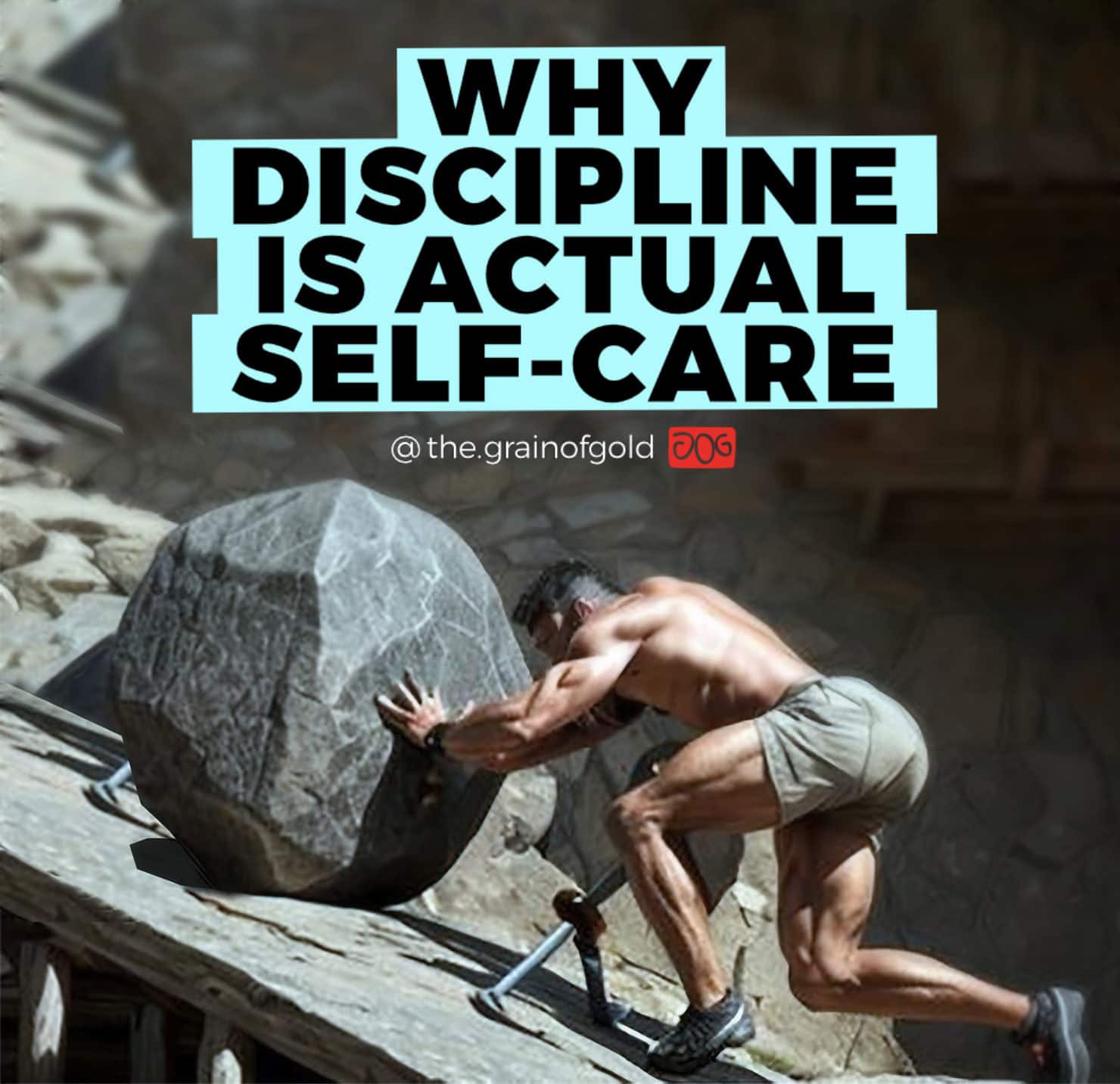
"Discipline isn’t about rigid rules or harsh routines. It’s about commitment and care, a steady way of showing up for ourselves that helps us grow self-trust, create healthy habits, and prioritize what truly matters in our lives."
Discipline as Self-Care: Reclaiming Self-Trust and Stability Through Small, Consistent Steps
When we think of self-care, we tend to picture comforting activities: a hot bath, a cozy read, or an evening spent unwinding. Rarely does “discipline” come to mind, and yet discipline may be one of the most valuable tools we have for building a life that genuinely supports us. It’s an unsung hero in self-care—quiet, persistent, and often misunderstood.
Discipline isn’t about rigid rules or harsh routines. It’s about commitment and care, a steady way of showing up for ourselves that helps us grow self-trust, create healthy habits, and prioritize what truly matters in our lives.
1. Why Discipline Often Feels Unpopular
Let’s be honest: discipline doesn’t exactly have the warm, inviting feel of traditional self-care. The word alone can bring up images of strict routines, intense focus, or constant restriction. It sounds more like a military command than a gentle act of love. But in reality, discipline is just consistency in action—it’s about building the habits that make life easier and more stable in the long run.
Discipline feels unappealing because it asks us to look beyond immediate comfort to something more substantial. This doesn’t mean we have to forsake all pleasure or joy, but it does mean that by choosing disciplined habits, we’re choosing to align our daily actions with the bigger picture of who we want to become. This shift in perspective can turn discipline from a chore into a meaningful practice.
2. Discipline as a Way to Rebuild Self-Trust
For many of us, self-trust is a wound that runs deep. We might have learned to ignore our own needs, to seek validation by putting others first, or to act in ways that kept us “safe” but distanced from our true selves. Over time, we can lose the ability to rely on ourselves, doubting our decisions, boundaries, and worth. Discipline offers a path back to self-trust.
Each time you commit to a small action—whether it’s getting up on time, preparing a nourishing meal, or taking a walk—you’re making a statement to yourself: I am here for you. This daily dedication helps bridge the disconnect that’s often created in childhood, where many of us learned to neglect our needs in order to please others.
By showing up consistently, discipline becomes a daily practice of trust-building. It’s like a steady conversation where you’re telling yourself, “I am listening, and I am here to support you.” As this trust grows, you start to feel more aligned with yourself and less dependent on external approval. The benefits of this trust compound, allowing us to navigate life with greater ease and confidence.
"Discipline is the engine behind consistency, and consistency is where true transformation takes place."
3. Small Habits, Big Changes
It’s easy to think of discipline as needing to be big or demanding, but the truth is, discipline is made in the small moments. This could mean setting a goal as simple as drinking a glass of water each morning or stretching for five minutes before bed. These little actions don’t demand a huge amount of energy, but they build consistency, which is at the heart of lasting change.
A consistent habit becomes a foundation, a small win that creates momentum. Over time, these small victories add up, reshaping our routines, supporting our well-being, and giving us a sense of accomplishment. The small, steady practices of discipline can shift our entire outlook because they become part of who we are and how we show up in the world.
When we make discipline manageable, it stops feeling like a punishment and becomes a tool for self-respect. We don’t have to transform our lives in a day; we just need to start somewhere, with something small. Every time we follow through, it’s a win that proves to us we’re capable of change.
4. Discipline Builds Consistency, and Consistency is Power
Discipline is the engine behind consistency, and consistency is where true transformation takes place. When we choose to show up regularly, we’re not just achieving a single goal; we’re creating a strong base from which personal growth naturally follows.
This consistency is powerful because it keeps us grounded. When we have a reliable routine, we experience a sense of stability and control that supports our emotional well-being. The small, regular actions we take—whether they’re related to health, mental well-being, or even creativity—build resilience over time. And it’s this resilience that enables us to handle life’s unpredictable challenges more gracefully.
Consistency rooted in discipline can anchor us, offering a kind of calm in the storm. While discipline can seem limiting, it ultimately brings a sense of freedom, because it allows us to be grounded, resilient, and clear-headed, even in the face of challenges.
"A consistent habit becomes a foundation, a small win that creates momentum. Over time, these small victories add up, reshaping our routines, supporting our well-being, and giving us a sense of accomplishment."
5. Discipline as a Way to Reconnect with Yourself
Our society places a lot of emphasis on outer achievements, on pleasing others, and on being “good enough” by external standards. For many, this has created a pattern of rejecting or neglecting our own needs to win approval. We’ve learned to look outside ourselves for validation, rather than turning inward to understand our true needs.
Discipline allows us to start listening to ourselves again. It’s a way to prioritize what we know is good for us, without needing validation from others. When we choose disciplined actions that support our well-being, we’re essentially reclaiming our own voice. Discipline empowers us to take ownership of our lives by focusing on what nurtures us, regardless of external opinions.
In this way, discipline becomes a form of self-reconnection. It’s an active, daily choice to honor our needs and to treat ourselves with respect and care. When we nurture this relationship, we become more self-aware, and we start to feel more centered in our own lives.
6. Discipline Empowers You to Prioritize What Matters
Not all forms of self-care feel good in the moment. Sometimes, it’s about doing things that are challenging or even uncomfortable, knowing they will serve us in the long term. Discipline gives us the strength to make these choices. By sticking to routines that we know will benefit us—whether it’s a regular workout, a journaling practice, or a tech-free evening—we’re sending a message to ourselves that our future well-being is worth the effort.
Discipline empowers us to prioritize what truly matters, even when it isn’t immediately satisfying. In a world that often prioritizes quick fixes and instant gratification, this commitment is an act of self-respect and love. When we choose disciplined actions that align with our deeper goals, we’re choosing to invest in ourselves in a meaningful way.
7. Getting Started with Discipline as Self-Care
If you’re ready to start viewing discipline as a form of self-care, remember that it doesn’t require an intense overhaul. Instead, start with small, achievable steps:
Pick One Small Habit – Choose one simple, beneficial habit, like drinking water in the morning or taking 5 minutes to breathe. Small steps build momentum.
Set Reminders and Track Progress – Use gentle reminders to help you stay consistent. Tracking your progress, even casually, can reinforce the habit and give you a sense of accomplishment.
Celebrate Your Wins – Acknowledge every time you follow through, no matter how small it may seem. This reinforcement builds motivation and makes the process enjoyable.
Reflect and Adjust – Check in with yourself regularly. Discipline should feel supportive, not restrictive. Adjust your habits as needed to keep them realistic and rewarding.
In a culture that often equates self-care with indulgence, discipline offers a refreshingly grounded approach. It’s not flashy or immediate, but it’s powerful in its quiet consistency. By embracing discipline as self-care, you’re not only investing in your well-being but also reconnecting with yourself in a way that’s truly transformative.
Discipline is a tool that empowers you to create a life rooted in trust, consistency, and self-respect—a life where you’re truly there for yourself, every step of the way.
You may also like
Realizing You’re Part of the Greater Whole
Carlos Alcaraz couldn’t bring home Olympic gold for Spain.…
Can I get my hair wet? – part 1 – How we lose control over our own bodies and minds
It was a hot summer day when I decided to get on my bike…
Whipped, muzzled – The Pavlovian Conundrum
I have an American friend who is very good at languages. He…




